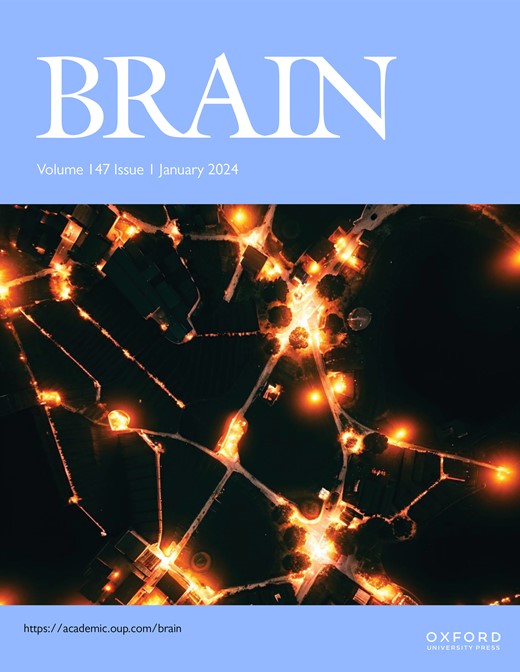SSPOP基因的复合杂合突变可导致癫痫和发育障碍。
IF 11.7
1区 医学
Q1 CLINICAL NEUROLOGY
引用次数: 0
摘要
SSPOP基因,目前被归类为人类基因组中的假基因,编码SCO-spondin蛋白,该蛋白在人类神经发育中起着重要作用,尽管其功能尚不清楚。在这项研究中,我们使用三基全外显子组测序,从三个不相关家庭的四个孩子中鉴定出复合杂合SSPOP变异,其中包括一对异卵双胞胎。这些儿童表现出不同的表型,包括发病年龄、癫痫符号学、对抗癫痫药物的反应以及神经发育障碍。我们通过确认其在转录和蛋白水平上的表达,证明了SSPOP是一个功能基因。我们分析了来自7名儿童患者的10个脑组织样本和人类iPSCs衍生的脑类器官,通过qRT-PCR、免疫荧光和Western blotting证实了其表达,支持其在产前和产后大脑发育阶段的生物学功能。此外,crispr介导的sspo敲除斑马鱼在体内表现出异常的神经发育和癫痫放电。总之,这些发现表明SSPOP是一个功能基因,是神经发育障碍和癫痫的潜在因素。本文章由计算机程序翻译,如有差异,请以英文原文为准。
Compound heterozygous mutations in the SSPOP gene lead to epilepsy and developmental disorders.
The SSPOP gene, currently classified as a pseudogene in the human genome, encodes the SCO-spondin protein, which plays an important role in human neurodevelopment, though its function remains poorly understood. In this study, we used trio-based whole exome sequencing to identify compound heterozygous SSPOP variants in four children from three unrelated families, including one pair of dizygotic twins. These children exhibited variable phenotypes, including variation in age of onset, seizure semiology, and response to antiseizure medications, along with neurodevelopmental disorders. We demonstrated that SSPOP is a functional gene by confirming its expression at both the transcriptional and protein levels. We analysed ten brain tissue samples from seven pediatric patients and brain organoids derived from human iPSCs to confirm its expression via qRT-PCR, immunofluorescence and Western blotting, supporting its biological function during both prenatal and postnatal stages of brain development. In addition, CRISPR-mediated sspo knockout zebrafish demonstrated abnormal neurodevelopment and epileptic discharges in vivo. Together, these findings suggest that SSPOP is a functional gene and a potential contributor to neurodevelopmental disorders and epilepsy.
求助全文
通过发布文献求助,成功后即可免费获取论文全文。
去求助
来源期刊

Brain
医学-临床神经学
CiteScore
20.30
自引率
4.10%
发文量
458
审稿时长
3-6 weeks
期刊介绍:
Brain, a journal focused on clinical neurology and translational neuroscience, has been publishing landmark papers since 1878. The journal aims to expand its scope by including studies that shed light on disease mechanisms and conducting innovative clinical trials for brain disorders. With a wide range of topics covered, the Editorial Board represents the international readership and diverse coverage of the journal. Accepted articles are promptly posted online, typically within a few weeks of acceptance. As of 2022, Brain holds an impressive impact factor of 14.5, according to the Journal Citation Reports.
 求助内容:
求助内容: 应助结果提醒方式:
应助结果提醒方式:


